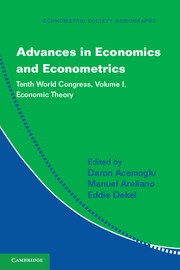Book contents
- Frontmatter
- Contents
- Contributors
- Preface
- I NONSTANDARD MARKETS
- 1 Matching Markets: Theory and Practice
- 2 The Economics of Internet Markets
- 3 Discussion of “Matching Markets: Theory and Practice”
- II CONTRACTS
- III DECISION THEORY
- IV COMMUNICATION/ORGANIZATIONS
- V FOUNDATIONS: EPISTEMICS AND CALIBRATION
- VI PATENTS: PROS AND CONS FOR INNOVATION AND EFFICIENCY
- Name Index
- Miscellaneous Endmatter
1 - Matching Markets: Theory and Practice
Published online by Cambridge University Press: 05 May 2013
- Frontmatter
- Contents
- Contributors
- Preface
- I NONSTANDARD MARKETS
- 1 Matching Markets: Theory and Practice
- 2 The Economics of Internet Markets
- 3 Discussion of “Matching Markets: Theory and Practice”
- II CONTRACTS
- III DECISION THEORY
- IV COMMUNICATION/ORGANIZATIONS
- V FOUNDATIONS: EPISTEMICS AND CALIBRATION
- VI PATENTS: PROS AND CONS FOR INNOVATION AND EFFICIENCY
- Name Index
- Miscellaneous Endmatter
Summary
Introduction
It has been almost a half-century since David Gale and Lloyd Shapley (1962) published their pathbreaking paper, “College Admissions and the Stability of Marriage,” in American Mathematical Monthly. It is difficult to know whether Gale and Shapley expected the literature they initiated to be used to improve the lives of masses of people all around the world. We are fortunate to see that this is happening today.
The model that Gale and Shapley presented is very simple. A number of boys and girls have preferences for one another and would like to be matched. The question Gale and Shapley were interested in especially was whether there is a “stable” way to match each boy with a girl so that no unmatched pair can find out later that they can both do better by matching each other. Gale and Shapley found that indeed there is such a stable matching, and they presented a deferred-acceptance algorithm that achieves this objective. Versions of the algorithm are used today to match hospitals with medical residents and students with public schools in New York City and Boston.
In 1974, Lloyd Shapley and Herbert Scarf published a related paper, “On Cores and Indivisibility,” in the first issue of the Journal of Mathematical Economics. Arguably, their model was the simplest exchange economy we could imagine. Each agent comes to the market with one indivisible good and seeks to trade it for more preferred goods that might be brought by other agents.
Information
- Type
- Chapter
- Information
- Advances in Economics and EconometricsTenth World Congress, pp. 3 - 47Publisher: Cambridge University PressPrint publication year: 2013
Accessibility standard: Unknown
Why this information is here
This section outlines the accessibility features of this content - including support for screen readers, full keyboard navigation and high-contrast display options. This may not be relevant for you.Accessibility Information
- 70
- Cited by
